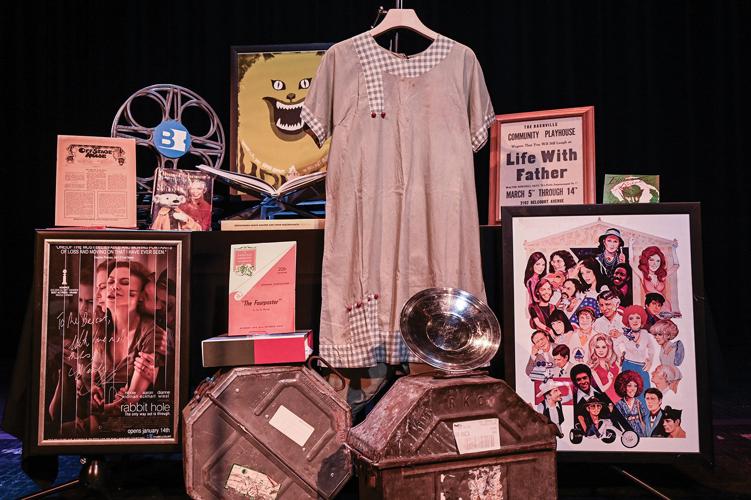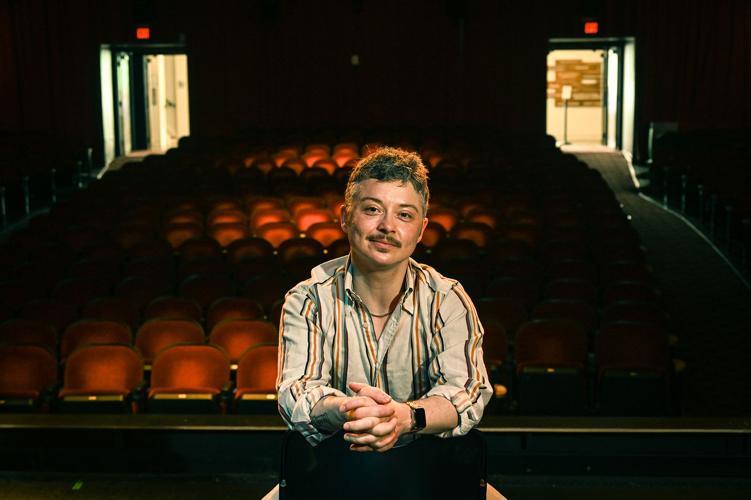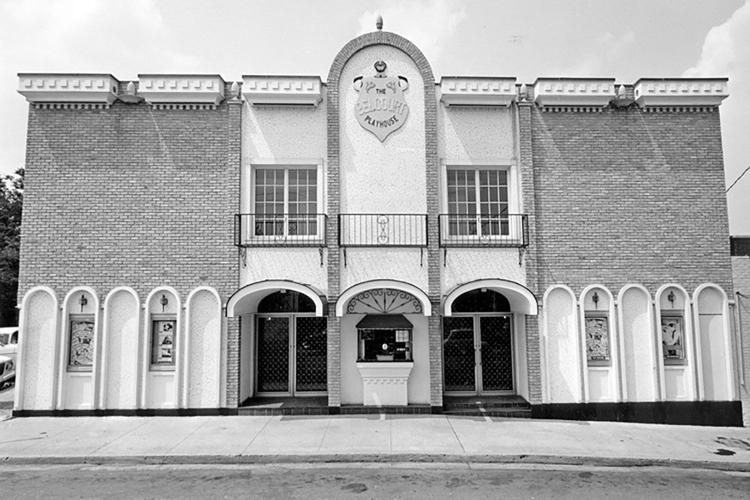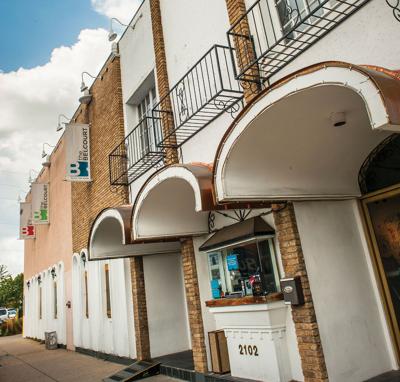When Belcourt Theatre historian and archivist Teddy Minton speaks about figures from the 100-year-old institution’s distant past, it’s almost as if he’s speaking to you about friends and acquaintances he knows personally.
There’s M.A. Lightman, the Nashville businessman and former champion wrestler who first opened what was then known as the Hillsboro Theatre back in 1925, and Fred Massey, the entrepreneur who purchased the building in 1966 to help its operators dig their way out of debt. There’s Lark Taylor, the thespian and founder of Nashville’s first theater guild, who graced the building’s stage in its earliest days as a playhouse, and Ellen Taylor Wallace White, the young actress who also trod the Hillsboro Theatre’s boards a century ago. When Minton talks about these people, whom he’s studied for the Belcourt Stories oral history project, he isn’t talking about ghosts from the building’s distant past — he’s talking about friends, artists, neighbors and community leaders whose histories are enmeshed with that of the Belcourt.

The Belcourt circa 1960
In 2022, knowing the nonprofit cinema center’s centennial was just over the horizon, Minton and Belcourt executive director Stephanie Silverman began discussing plans for an oral history project. Having recently received a master’s degree in public history at Middle Tennessee State University, Minton — a touring musician working front-of-house at the Belcourt — was perfectly positioned to helm the Belcourt Stories Project, which launched in early 2023.
To celebrate the theater’s centennial, the art house is gathering recollections from the public
“What was really central to it, for Stephanie in particular, was getting a comprehensive oral history with as many people related to the theater’s history as we could as a way to just capture memories and stories,” says Minton, who’s quick to credit current and former Belcourt staffers Jon Keller, Jessica Breanne, Dylan Carver and Bob Roberts with helping lay the groundwork ahead of Belcourt Stories. “But also, [we wanted to find] hard facts about the things we didn’t know, which was actually quite a bit. I mean, we knew the highlights — when we opened, when the Opry [was here].”
As it turns out, a neighborhood theater that changed hands multiple times and nearly shuttered more than once is not necessarily the sort of institution that has kept consistent records. Minton notes that — particularly after the theater’s return to screening films in the 1960s, following several decades of operation primarily as a playhouse — institutional information from some eras of the Belcourt is scant, with records and artifacts “scattered to the winds.”

Teddy Minton at the Belcourt
“The process was trying to determine, ‘Who are the most important people that we know of?’” says Minton. “And then just issuing a broader ask to our community — we put together a trailer, which we ran [before films] — and through that, some people reached out to me. [Some people said], ‘My father was a projectionist there back in the ’60s.’ Or, ‘My grandmother used to act on your stage.’ And most of these people were our members. A couple of them were just people who come every now and then.”
In addition to interviewing patrons and community members, Minton has also conducted extensive research both online and in person using the archives of the Nashville Public Library, the Tennessee State Library & Archives, the Grand Ole Opry, the New York Public Library, the Country Music Hall of Fame and many more. (He’s also exceedingly grateful for newspapers.com.)
“Because we’ve been here for 100 years, we have the benefit of having our history as being part of lots of tendrils of Nashville’s history,” he says. “If you zoom way out on all the oral histories, it’s really about not just everyday Nashvillians and their collective, interpersonal histories, but really about Nashville’s relationship to cinema culture and film culture over 100 years, and in some cases, reaching all the way back to the beginning of cinema in the late 1800s. It’s a privilege to be in a place where there are people coming in today whose ancestors were part of the very first guild of actors on our stage 100 years ago.”
Planks. Decades-old wooden planks.
When asked if there are any special artifacts he’s come across during his research, Minton has just the story. He happened across evidence of a newsreel filmed in 1929 featuring the aforementioned Lightman — the native Nashvillian and natural showman who opened the Belcourt as the Hillsboro Theatre in 1925 — speaking to Tennessee Gov. Henry Horton about the advent of sound in film. Minton contacted an archivist in South Carolina, who digitized the newsreel and sent it along. “Now we have this,” says Minton, “the only known moving image and voice of M.A. Lightman, who opened the theater.”
“We’re very well-known as Music City, and that is completely valid, but we do have quite an in-depth relationship to film and cinema culture,” he says. “I think a lot of people don’t really know that. Some people know the highlights of it, of course — you know, there’s the Ernest films, the [Ron] Ormond films and all of that that have put us on the map. And those, of course, are very much related to Belcourt history. But also, where were the first places that people actually watched moving images, right? That sort of thing is what I’m hoping I can tell through this project.”
In the coming year, Minton promises lectures, special programming, online engagement and rotating exhibits in the building’s upstairs alcove. He says people can keep an eye on the @belcourthistory Instagram account for updates, and stay tuned for a collaboration with Nashville Sites called Music City Movies — a driving and walking tour of Nashville centering on the city’s relationship with film culture.
What was the best moment you missed at the Watkins Belcourt in the past three months? Hard to say. Maybe it was an uncharacteristically large …
As the Belcourt Theatre, now a nonprofit, heads into its second century, its status as a lasting center for the arts seems firmly cemented. But its ongoing existence as a movie house wasn’t always a foregone conclusion. It nearly closed its doors multiple times, perhaps most notably in 1999. In a Nashville Scene cover story under the headline “Fade to Black,” longtime staffer Jim Ridley wrote on Jan. 21, 1999: “If the Belcourt ends up demolished — a likely possibility — it will join the beautiful old Tennessee Theatre, the Inglewood, the Belle Meade, and all the other historic movie palaces that we allowed to fall or be closed. Each theater was irreplaceable, a measure of our civic history and aspirations. More importantly, it was Nashville’s alone — not a chain, not a mass-produced structure, but a singular entity that set us apart from every other city on the make. Lose the Belcourt, and we lose one more irretrievable piece of our identity.”

Items from the Belcourt's history
But Nashville heeded Jim’s call. After a temporary closure, grassroots group BelcourtYes! banded together to purchase the building in March of that year, bringing it back from the brink of permanent disappearance. A decade-and-a-half after that, the ailing Belcourt launched a capital campaign to raise the funds for massive — and very necessary — renovations. It was successful, and the theater closed for roughly seven months to undertake an ambitious upgrade. (Jim was not around to see the newly revamped Belcourt’s July 2016 reopening, having died suddenly during its temporary closure. The Belcourt’s lobby is now named for him.)
“When this place was about to be disappeared by time, people had to come in and say, ‘We think this place has value, and it reflects something about local history that we appreciate, and we want it to stay,’” says Minton. “We’re kind of the last bastion of an era, and because people saw to it to save us multiple times over 100 years, we exist, and we are now as old as some of the oldest institutions in this city.”
The beloved Nashville nonprofit celebrates its 100th birthday this week









